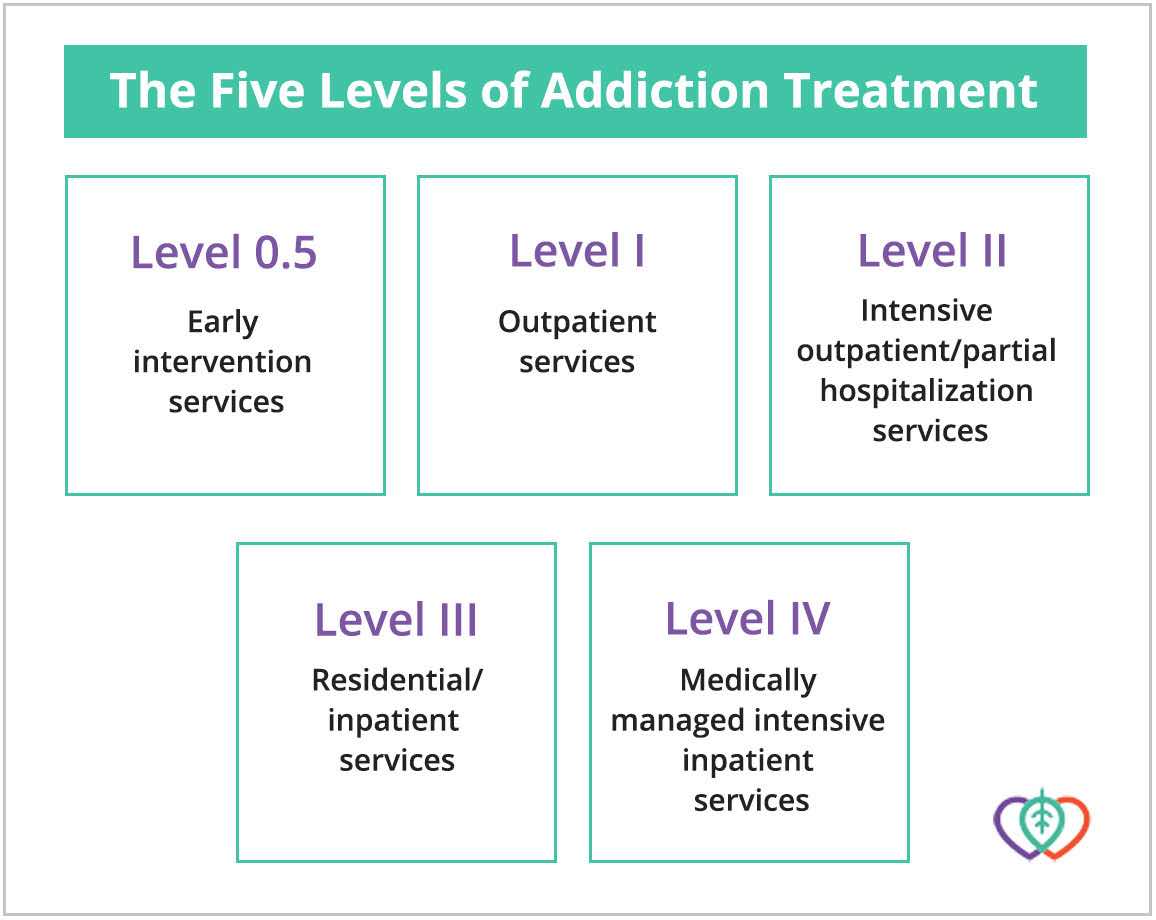Every person has different needs when it comes to substance abuse treatment. When patients first enter rehab, it is important
they are assigned to the proper level of care.
This approach to treatment, or continuum of care, ensures that patients receive adequate care upon admission and are smoothly
transitioned to a higher or lower level of care as needed. According to the American Society of Addiction Medicine, there
are five main levels of treatment in the continuum of care for
substance abuse treatment.

The continuum of care was developed to ensure uniformity through the treatment process.
This makes what happens in rehab more efficient for patients who transition from one level of care to the next.
Dr. Kevin Wandler of Advanced Recovery Systems discusses the levels of care provided by alcohol and drug rehab facilities.
Level 0.5: Early Intervention Services
Early intervention services are a precursor to treatment. They are designed for adults or adolescents who are at risk of
developing a substance use disorder but do not display any diagnostic criteria to be admitted to rehab.
During early intervention, treatment focuses on the risk factors that predispose the person to
drug addiction and educates the individual about the negative repercussions of drug misuse.
The duration of early intervention services greatly depends on the patient’s understanding of the perils of substance use
and whether he or she makes behavioral changes to avoid the path to drug addiction. Patients are closely monitored for
symptoms that indicate they need a higher level of treatment.
Level I: Outpatient Services
Outpatient treatment requires patients to attend regularly scheduled meetings. This level of treatment allows patients
to carry on with their routine while receiving face-to-face services with addiction or mental health professionals. It
is ideal for people who have jobs or a strong support system at home, and it typically costs less than other levels of
treatment.
Level I care includes evaluation, treatment and recovery follow-up services. It addresses the severity of the individual’s
addiction, helps implement behavioral changes and ameliorates mental functioning. Patients may transition to the
first level of treatment from a more robust program. Level I is also a stepping stone for people who are not ready or
willing to commit to a complete recovery program.
Level II: Intensive Outpatient/Partial Hospitalization Services
The second level of treatment can accommodate medical and psychiatric consultation, psychopharmacological consultation, medication
management and 24-hour crisis services. The program is affiliated with other levels of treatment in the continuum of
care and provides support services such as child care, vocational training and transportation.
Nanci Stockwell of Advanced Recovery Systems explains why outpatient treatment may be more appropriate for some people in
recovery from addiction.
Level II.1: Intensive Outpatient Services
This program comprises counseling and education about mental health and substance use issues. Patients are referred to psychiatric
and medical services if addiction specialists deem it necessary. However, intensive outpatient programs cannot treat
unstable medical and psychological conditions.
Level II.2: Partial Hospitalization Services
Unlike intensive outpatient programs, where the patient has to be referred to outside psychiatric and medical professionals,
partial hospitalization provides direct access to those services along with laboratory services.
Level III: Residential/Inpatient Services
Level III of the continuum of care provides
residential substance abuse treatment. This level of treatment is typically appropriate for patients who have functional
deficits or require a stable living space to help with their recovery.
Nanci Stockwell of Advanced Recovery Systems discusses the advantages of inpatient, or residential, treatment for addiction.
Treatment and assistance are provided around the clock, and the facility is staffed 24 hours a day, seven days a week. The
patients may live on site or in a living facility in close proximity to the
drug and alcohol treatment center so nearby services are readily available.
Level III.1: Clinically Managed Low-Intensity Residential Services
At this level, services focus on teaching recovery skills,
preventing relapse and improving emotional functions. Professionals also help people relearn essential life skills
that will benefit them personally and professionally after treatment.
- Outpatient substance abuse services
- A structured recovery environment
- 24-hour staffing
- House meetings
- A community that promotes living skills.
This level of treatment requires the facility to be fully staffed and equipped with treatment services.
Level III.3: Clinically Managed Medium-Intensity Residential Services
Also called extended or long-term care, this treatment program provides a structured environment and medium-intensity clinical
services. It is designed for patients who have been deeply affected by substance abuse, including those showing temporary
or permanent cognitive deficits.
Robust treatment is offered at a slower and more repetitive pace to help the patient overcome mental impairments such as
Wernicke-Korsakoff syndrome, traumatic brain injury or intellectual disability associated with drug use. This level of
treatment provides ongoing case management with services including housing, vocational needs, transportation and continued
self-help meetings. It aims to assist patients with societal reintegration.
Level III.5: Clinically Managed High-Intensity Residential Services
This program is designed for individuals who have multiple issues and have had a series of unsuccessful interventions. The
issues may include substance use disorders, criminal activity, mental disorders, impaired functioning and difficulty
adapting to societal norms. Level III.5 caters to people with chaotic, nonsupportive and abusive relationships.
Level III.7: Medically Monitored Intensive Inpatient Services
Medically monitored treatment is directed toward individuals with functional deficits such as withdrawal risks, medical issues
or emotional issues that prevent the person from progressing in the
recovery process.
Facilities offering level III.7 treatment provide 24-hour professional evaluations, observation, medical monitoring and addiction
treatment.

Level IV: Medically Managed Intensive Inpatient Services
Out of the four levels of treatment, level IV is the most comprehensive and intensive. It offers 24-hour medically directed
evaluation, care and treatment, including daily meetings with a physician. The facilities are usually equipped with the
resources of general acute care or psychiatric hospitals and offer substance abuse treatment that also addresses
co-occurring disorders.
The last level of treatment focuses on stabilizing patients and preparing them for transfer to a less robust level of care
for continued monitoring as they progress toward recovery.
Medical Disclaimer: DrugRehab.com aims to improve the quality of life for people struggling with a substance use or mental health disorder with fact-based content about the nature of behavioral health conditions, treatment options and their related outcomes. We publish material that is researched, cited, edited and reviewed by licensed medical professionals. The information we provide is not intended to be a substitute for professional medical advice, diagnosis or treatment. It should not be used in place of the advice of your physician or other qualified healthcare provider.
Author
Author,
DrugRehab.com
Sonia Tagliareni is a writer and researcher for DrugRehab.com. She is passionate about helping people. She started her professional writing career in 2012 and has since written for the finance, engineering, lifestyle and entertainment industry. Sonia holds a bachelor’s degree from the Florida Institute of Technology.
View Sources
 Addiction
Addiction
 Treatment
Treatment
 Faith & Religion
Faith & Religion
 Active Recovery
Active Recovery
 Our Community
Our Community






